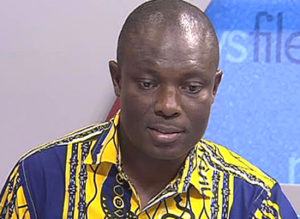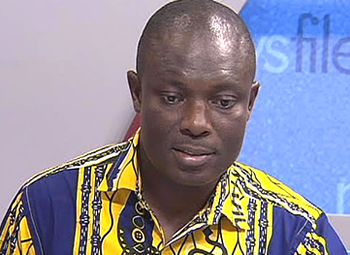
A former deputy Minister of Finance, Kwaku Kwarteng is saying for years Ghana’s economy has been ran like a Ponzi scheme.
As a matter of fact, he is not saying anything new. Many other Ghanaians have been saying that for years. And when they do, foot soldiers call them names and hurl insults at them.
But what’s intriguing is the fact that he has been part of the scheme for years. As a former deputy Minister of Finance, he was very much part of the scheme. What did he do about it? Did he try to do anything to change it from within?
Interestingly, most people in public office, like Kwarteng, know what’s right and what ought to be done, but they won’t do it. Often, they can’t. The political system is set to run like a Ponzi scheme. It’s more or less like a scam, meant to benefit a small cartel of insiders, and so anyone who seeks to do right – which is often contrary to the myopic interests of the cartel, is seen as an enemy and penalized in one way or the other.
There is enough evidence to that effect. There is the story of Daniel Domelevo, the former Auditor-General, Akua Manfo aka Blakofe, a former deputy CEO of the Ghana Tourism Development Authority and now what is being done to the Special Prosecutor in other to frustrate him and derail his efforts at tackling official corruption.
Kwarteng, for instance, believes that the current economic crises at both national and household levels are the results of decades of poor governance, marked by political mismanagement and economic inefficiency across various administrations.
There is enough evidence to that effect. There is the story of Daniel Domelevo, the former Auditor-General, Akua Manfo aka Blakofe, a former deputy CEO of the Ghana Tourism Development Authority and now what is being done to the Special Prosecutor in other to frustrate him and derail his efforts at tackling official corruption.
Kwarteng who is a Member of Parliament and had served on the Finance Committee in Parliament issued a statement saying since gaining independence, Ghana has consistently spent beyond its means and relied on borrowing to cover the excess.
“We always offer higher interest to lenders, borrow more, use a part to repay previous debts, and the rest to pay for the current year’s overspending. So, we have been running our country’s economy like a Ponzi scheme. The economy is struggling today because lenders are now refusing to lend to us. It is just like a Ponzi scheme going into crisis once people stop depositing their monies with them,” he said.
He added that for the New Patriotic Party (NPP), which he belongs to,”to break the eight, we must first break the norm.”
Kwarteng reiterated that since independence, Ghana has consistently spent beyond its means and relied on borrowing to cover the excess, adding that many of these expenditures are poorly prioritized
According to him, many Ghanaians, including himself, are concerned that if the country continues on its current path, its democracy could collapse, along with all political parties. Critical journalists and commentators have been saying these for years, and they have been attacked and threatened in some cases.
He further indicated that to save the country from this looming danger, the political class must acknowledge this reality and change their behaviour, as time is running out for Ghana.
“Since independence, the political norm has been that a political party going into an election must sing praises of its past achievements and make high-sounding promises for the future. At the same time, a political party must paint its opponents in the worst possible light. We have mastered this art, and in the process, we have forgotten that politics should be about the future of our children and our motherland. We have reduced election campaigns to bitter struggles between competitors seeking power for the wrong reasons,” he said.
The events of the last few years have more than confirmed the concern among governance critics that, there has been a growing trend of abuse of power and office for personal gain mostly by elected and appointed officials, with very little or no interest in the greater good.
Kwarteng is now speaking out. Is he speaking out a little too late? When did he realise this, and why is he now speaking out?
The events of the last few years have more than confirmed the concern among governance critics that, there has been a growing trend of abuse of power and office for personal gain mostly by elected and appointed officials, with very little or no interest in the greater good.
The police for instance, has been used to aggressively hold back public protests against the Ponzi scheme with its debilitating effects on the country. Making the police look more like a private security apparatus being used by the cartel to deny the rights of citizens to express their pains resulting from bad governance and mismanagement.
The political class say what they think would win them power, and often do what they think is politically advantageous, even if those actions have long term negative impacts on the country. It is so, to the extent that most ordinary citizens have been indoctrinated to think of their political parties first ahead of the good of the country.
Kwarteng is possibly not the only politician who thinks the way the country is being ran is counterproductive, but would they also come out to add to his voice and agree to work together to change the system form within? Or it’s impossible to penetrate the system from within and change it?
Ghana won’t go far, unless the Ponzi scheme is dismantled and a proper system of governance based on the principles of rule of law and accountability is established and consciously pursued.
By Emmanuel K Dogbevi
Copyright ©2024 by NewsBridge Africa
All rights reserved. This article or any portion thereof may not be reproduced or used in any manner whatsoever without the express written permission of the publisher except for the use of brief quotations in reviews.
The post When Kwaku Kwarteng discovered the Ponzi scheme, what did he do? appeared first on Ghana Business News.









![“It’s hard to say goodbye” – Christian Atsu’s wife composes emotional tribute song for him [Video]](https://ghananewss.com/storage/2023/05/Christian-atsu-and-wife-100x75.jpeg)








